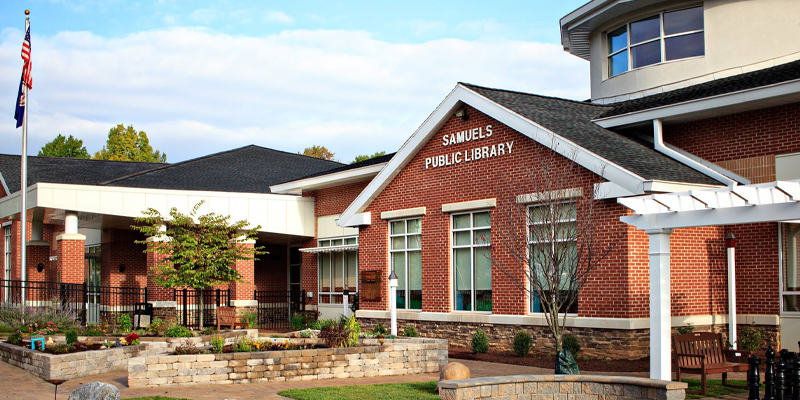July 9, 2025, 12:53pm
Photo from The Samuels Public Library
After being targeted by anti-LGBTQ book banners and having their funding pulled, a local library in Virginia successfully stopped a threatened takeover by a private equity group. The local community rallied around The Samuels Public Library in Front Royal, Virginia, to push back against attacks and the private equity owned Library Systems & Services withdrew their bid to run operations. But with their funding cut for the fiscal year that began this July, the library is now left in uncertain territory.
The Samuels Public Library has thrived for nearly all of American history; it was founded in 1799, making it the second oldest library in Virginia. The library was renamed Samuels in the ‘50s and has more recently operated as a nonprofit that partners with the local government. Its service record is impressive: it won the 2024 Virginia Library of the Year award and according to the local Royal Examiner, in the last year it added 2,204 new cardholders, hosted 542 programs, and had 401,859 checkouts.
The library’s recent trouble started a few years ago, when Samuels became the target of a group wanting to remove childrens books from its stacks. In 2023, “Clean Up Samuels” filed hundreds of complaints over books they didn’t like, which were predictably mostly books with LGBTQ themes. One of the group’s members told the AP that their complaints were rooted in taxpayer concerns over “self rule”, which is ironic given that the fight ended with an attempt to outsource the library’s management to a private, for-profit company.
Siding with the book banners, local Warren County officials voted to withhold funding from the library. Samuels stood firm against censorship, and their funding was eventually restored. But this March, the Warren County Board of Supervisors voted against renewing annual funding, citing poor management and announcing their intention to bring in the out-of-state LS&S to run the library.
LS&S is no stranger to provoking these community fights. Googling the company turns up a lot of articles and op-eds protesting local library takeovers, reports of lawsuits, and Reddit threads warning librarians to be wary of working for them. LS&S started in the ‘80s building software to manage catalogues, and won government contracts at federal agencies when Reagan pushed to privatize much of the federal government’s operations.Today, they’re owned by Evergreen Services Group, a private equity firm with a vast array of subsidiaries, many in government outsourcing and defense.
The Times wrote about the company back in 2010, when it was brought in to manage a California Library and had grown to the “fifth-largest library system” in America. In the article, Frank A. Pezzanite, the former CEO of LS&S, describes his job in terms of efficiency and streamlining, which means a lot of cuts:
“There’s this American flag, apple pie thing about libraries,” said Frank A. Pezzanite, the outsourcing company’s chief executive. He has pledged to save $1 million a year in Santa Clarita, mainly by cutting overhead and replacing unionized employees. “Somehow they have been put in the category of a sacred organization.”
…
“A lot of libraries are atrocious,” Mr. Pezzanite said. “Their policies are all about job security. That’s why the profession is nervous about us. You can go to a library for 35 years and never have to do anything and then have your retirement. We’re not running our company that way. You come to us, you’re going to have to work.”
Finally, a company brave enough to stand up to librarians.
I’m glad that Samuels has been able to beat back LS&S, but this episode is another example of how the totalizing market logic of business can work hand in hand with punitive actors within government. When you can’t get people to support a plan to alter public services, a private company can come in streamline them to death.
In their defense, I think some of these businesses think they’re doing the right thing. But the valorization of profit has blinded them to seeing the advantages of the public good as a worthy bottom line. Providing for a community might not be profitable, but that doesn’t make it wrong.
I’m reminded of an NPR interview with a disillusioned DOGE staffer who didn’t discover a den of corruption and laziness in the federal government. “The government is really not wasteful,” he said.
The government commits to doing a lot of things for its citizens, but generally, it executes on them decently well, full of amazing, hard-working, educated people. Is it too nice to those people? Maybe. Is it too nice to citizens? Maybe. Is it—could it be run more efficiently? Probably. But is efficiency always the goal? No, I don’t know.
Efficiency shouldn’t always be the goal, especially when used as a narrowly defined metonym for profitability. The Samuels Public Library, like so many public institutions around the country, works because it serves something other than money.
If you want to support Samuels as they fight to get their funding back, you can donate on their website.
